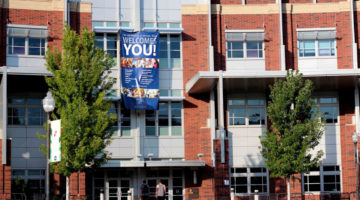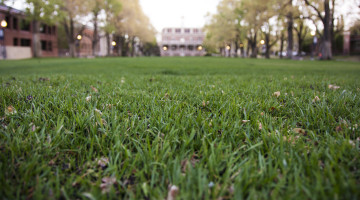
Breanna Denney/Nevada Sagebrush
Jan Taylor, a heart transplant recipient, poses among a field of balloons in front of the Joe Crowley Student Union on Wednesday, Oct. 14. The roughly 550 balloons each represent a person waiting for an organ transplant.
by Jacob Solis
In the oddly harsh mid-October sun, eight people stood in the shade. They were representatives from Donor Network West and the Orvis Student Nurses’ Association and they came to talk to students of the University of Nevada, Reno, about organ donation. From Monday to Wednesday, these people told their stories to whoever would listen.
For many, students or otherwise, the idea of donating organs holds a certain stigma: it’s defiling the body, it makes someone not whole, the doctors only want to steal organs, it’s scary.
For the people of Donate Life Week, these reasons just don’t hold water.
“We’re not talking about death right now, we’re talking about if something should happen, an accident, and your wishes are to save someone you could,” said Bené Michael, an organ recipient and ambassador with Donor Network West. “I don’t understand why people wouldn’t do it. There’s no maiming of the body, I guess maybe there’s religious reasons … but I can’t imagine what it would be like to not have gotten this gift.”
Michael received a kidney from a living donor, a complete stranger, that saved her life. Since that day, 16 years ago, they’ve been best friends, with Michael even calling her “my angel on earth.”
Despite this, over and over the Donor Network West ambassadors and the student nurses ran into people who were afraid of the idea of organ donation, according to OSNA President Jessica Moiseyev.
“We want to help people sign up to be organ donors because we’re in the hospital and we see these patients that aren’t organ donors and how many lives they could save if they were registered organ donors,” Moiseyev said. “We want to help sign people up and we want people to understand it more. People think of it as a way bigger deal than it is.”

Breanna Denney/Nevada Sagebrush
Jessica Moiseyev, president of the Orvis Student Nurses’ Association, poses outside the Joe Crowley Student Union with a mock driver’s license on Wednesday, Oct. 14. OSNA teamed up with Donor Network West to put on the three-day-long Donate Life Week, which aimed to raise awareness about organ donation.
Moiseyev added that while some people were wholly opposed to the idea of organ donation, others were curious and receptive about the process. For these people, organ donation was abstract. But for people like Jan Taylor, organ donation was a lifesaver.
Four years ago, Taylor got very sick. Struck ill by the genetic lottery, her heart muscle was failing from cardiomyopathy, and she needed a transplant. A device, the left ventricular assist device which buoys the heart’s ability to pump blood, kept her alive for nine months while she waited on the transplant list.
But even when a heart became available, the struggle wasn’t over. Taylor’s transplant was complicated by the fact that doctors had to remove the LVAD equipment in addition to replacing her heart — the latter of which alone can take up to 16 hours. Taylor survived the operation but was left with complications.
“During the transplant and throughout the following days I had collapsed lungs, my kidneys went into failure, I had to go on dialysis — if you can think of a complication it happened,” Taylor said. “I ended up being in the hospital another five months. During the first six weeks, [my] husband had an affair with a nurse. I’m stuck in a hospital bed, can’t move, and I watched him leave every day to go be with the nurse.”
Even so, Taylor remained optimistic, pinning her hope and will to live on her love of her family. Her nurses and family stood by her through many long nights, and she was driven by that desire to live and a desire to honor the life of her donor, a 27-year-old man.
“You put it in your mind that survival is far more important than an idiot husband and an unscrupulous nurse, because I had a lot to live for,” Taylor said. “I had a family, I had two beautiful daughters … you focus on that. Life is more important than the stupid decisions people make.”
Her story, barring some of the more personal details, is not unique. In Nevada, there are roughly 550 people waiting for an organ transplant. Nationwide, that number jumps to more than 123,000. Some 7 percent of them, roughly 6,500 people every year, will die before they can receive a transplant, according to the American Transplant Foundation.
On Wednesday, organizers inflated a red balloon for every person in the state still waiting for a transplant, creating a visual reminder of the gravity of organ donation. For Bennett Queen, a community education assistant for Donor Network West and event organizer, Donate Life Week was a success.
“We’ve signed up a lot of new donors, we’ve talked to people who are already donors … and people who don’t want to be organ donors, at least they have the word in their head,” Queen said. “At any time, you could be on the donor family side where you could save someone’s life or the transplant side, where you need a transplant, so I think it’s beneficial for everyone to see what goes into being an organ donor.”
Jacob Solis can be reached at jsolis@sagebrush.unr.edu and on Twitter @TheSagebrush.











